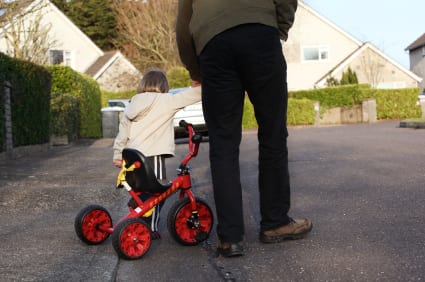 The other day I was walking my two dogs on our street. My son was walking with me. Before we left the house, he had asked if he could bring a chocolate milk with him and drink it on the walk. I said yes and thought nothing of it.
The other day I was walking my two dogs on our street. My son was walking with me. Before we left the house, he had asked if he could bring a chocolate milk with him and drink it on the walk. I said yes and thought nothing of it.
As we were walking, the plastic that covers the straw, which my son had removed and was carrying in his hand, had gotten away from him and blew into the street. As soon as it was out of his hand, he panicked and went after it. Right into the street!
A parent nightmare, right? We’ve all been there, right?
I won’t drag out the suspense, he was not hurt at all. As a matter of fact, the street was completely free of any traffic. (It is a residential street and has periods when there are no cars.)
My child did, however, run into the street to chase after that piece of plastic. He thought he had to hang onto it. His reaction was to get it back immediately.
I yelled as soon as I realized what was going on. “Get back!” I screamed.
My son stopped, looked at me with big eyes, and immediately rushed back to my side. Relief flooded through me. I looked and saw no cars.
Again, many of us parents have been there.
This incident brought me back to similar one when my child was four. This was when we often partook in the classic toddler chase game. He’d run, I’d chase, he’d laugh.
I was talking to a co-worker when my toddler decided to begin the chase game by himself. The problem was his chase game was taking him toward a very busy street. I still remember the moment like it was yesterday, my thoughts something in the vein of, “Oh,_____.” You know what goes in the blank. Parents understand that skip of their heartbeat very well.
I ran, hard! He was four and no way was I going to trust him to stop on command! I grabbed my laughing toddler at the opening that led to the busy street. I exhaled. Nothing bad happened. My child thought it was just our game. He was so young and it was hard to explain to him the meaning of what could have happened if he was going to go running toward a busy street.
Now, several years later, I am able to discuss these things with my son. I discussed his reactions, what he deems important versus the dangers that are out there because of such reactions. I talked to him about never running into a street to chase after anything! He could get hit by a car and Mommy and Daddy NEVER want that to happen! I apologized for yelling but explained to him why I had yelled, his running into the street had scared me! I made him promise me to try to never do that again! We talked about it for quite a while because I really wanted him to understand how important his safety is to me.
Are these examples necessarily autism-related? Probably not.
However, autism parents like me do know that our kids get lost in their own worlds. When it comes to walking our street, for example, I have to constantly remind my son to check the driveways before crossing. My son will run and make his “noises” and forget to stop and look for cars. We have long driveways in our neighborhood. Many of the driveways are blind.
This is a safety concern that I feel relates to my son’s autism because he is lost in his own world and wants to run to regulate his body. I don’t necessarily have a problem with either of those things, until they relate to him not paying attention to the potential dangers that are out there.
Swimming is another safety concern I share with other parents of children with autism. A child with autism will literally enjoy the experience of being underwater. It is quiet under the water, it’s not overstimulating to them. The water feels good to their bodies. It can be very calming.
With very young children on the spectrum, they often do not realize they must come up for air. This is a major concern with swimming instructors of young children on the autism spectrum. Instructors will immediately begin to teach swimming safety to both a young child AND the parents of that child so that they understand the safety concern.
And, yet again, is swimming safety just an autism-related issue? Of course it isn’t.
But, safety issues with our children are heightened because of their habit to “check out” more than a typical kid. My son, for example, was upset about that missing piece of plastic until I went and retrieved it for him (asking him to remain standing on the sidewalk, which he did). Knowing him, he might have gone on and on about the piece of plastic. That’s why I retrieved it. I didn’t want a potential tantrum and I also didn’t want him taking matters into his own hands by making an attempt to get it himself. Our kids get like that. It just comes with the territory.
Just like parents of typical children, autism parents are looking out for the safety of our kids. Children with autism do need a bit more of safety awareness, however. Understanding why they do the things they do will help you possibly predict the reactions of your kids so you may be able to head off dangers. Their safety should be on the top of your list.





